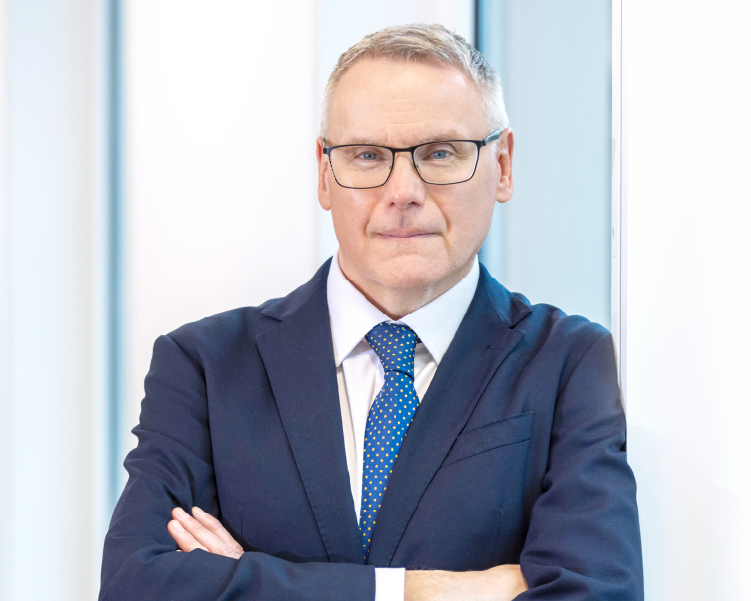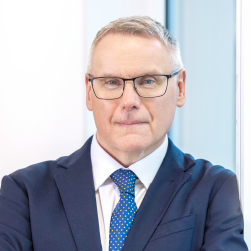by Chris Elms, interim Chief Executive Officer, Euroclear UK & International
UK digitisation - how FMIs can play their part
How can Financial Market Infrastructures (FMIs) play their part in delivering on the UK’s digitisation programme? Chris Elms, interim CEO of Euroclear UK & International, shares his thoughts.
In a bid to enhance London’s position as a premier centre for capital raising, an ambitious digitisation agenda has been proposed, including the dematerialisation of paper share certificates, discontinuation of dividend payments by cheques as well as improvements in shareholder rights and communications.
Retail investment in the UK is a case in point for the positive impact digitisation can bring. From 2004 to 2022, the share of UK households directly owning stocks and shares halved from 22% to 11%*. Sweden, on the other hand, has a highly engaged retail investor base: 22% of Swedish population directly owned stocks in 2022. This is partially powered by the high level of tech adoption and a strong supply of capital for Small and Medium-sized Enterprises (SMEs).
If UK households invested 25%, instead of 15%, of their financial assets in equities and funds, this would unlock an estimated amount of extra £740 billion of capital. To widen retail participation in equity markets and strengthen the British economy, digitisation efforts which aim to reduce costs and improve efficiencies will be instrumental.
So how can FMIs help deliver on the UK’s digitisation vision? There are three aspects I would like to highlight: resilience, market service expertise, as well as new technology and innovation.
FMIs are a unique type of player in the market. Given our central and neutral position in the financial ecosystem, we play a key role in supporting market stability and resilience. This is especially crucial when implementing changes to a market.
FMIs must comply with all relevant regulatory requirements including the stringent reforms introduced after the global financial crisis. FMIs are also bound by the international principles of The Committee on Payments and Market Infrastructures - International Organization of Securities Commissions (CPMI-IOSCO), which set out obligations for us to preserve systemic stability and respect public interest.
At Euroclear UK & International, the UK’s Central Securities Depository, we hold an average of £5 trillion of assets under custody. We operate the trusted settlement system, CREST, which settles the overwhelming majority of UK equities by value that are already held in electronic form. We also offer a variety of services, from collateral management, corporate actions processing to an end-to-end solution for your funds business.
We connect issuers with capital market participants, including local and international brokers, banks, custodians and institutional investors. Retail and private individuals can also open an account in their name and have an indirect CREST connection via their retail bank or broker.
Although FMIs are renowned for being stable, resilient and secure, there is an additional characteristic which people are less familiar with: our focus on new technology and innovation.
Euroclear recently launched Digital Securities Issuance (D-SI), the first service on our Digital Financial Market Infrastructure (D-FMI) platform. The service enables the issuance, distribution and settlement of fully digital international securities on Distributed Ledger Technology (DLT).
D-SI offers a hybrid model that bridges DLT and traditional infrastructure by enabling issuance on the DLT based platform while connecting to Euroclear’s existing settlement infrastructure for secondary market operations. This approach offers investors full access to the trading venues and liquidity management facilities they are already familiar with. This also means we can balance bonds from legacy to DLT in a non-disruptive way.
Recently, D-SI successfully facilitated World Bank to raise €100m to support the financing of their sustainable development activities. This is an integral piece of our Group’s overall strategy to advance digital infrastructure across financial markets.
Personally, I see a great deal of potential in DLT in delivering operational efficiency in various areas such as settlement, reconciliation and ultimate beneficial owner identification. Leveraging such technology will be inevitable in financial market digitisation.
Implementing changes to the market should be done with precision and care, and we must ensure we have the right infrastructure to support market participants in the move to digitisation.
Collaboration is vital. As technology and regulatory standards evolve, Euroclear as an FMI remains committed to working closely with central banks and regulators to enhance the efficiency of the financial system and address the needs of issuers and investors with the right safeguards.
Implementing changes to the market should be done with precision and care, and we must ensure we have the right infrastructure to support market participants in the move to digitisation.
Collaboration is vital. As technology and regulatory standards evolve, Euroclear as an FMI remains committed to working closely with central banks and regulators to enhance the efficiency of the financial system and address the needs of issuers and investors with the right safeguards.
I am a firm believer that embracing the digitisation agenda will greatly advantage the UK financial services sector and bolster London’s long-term position as a premier capital raising hub. Building on resilience, market service expertise and innovation, collaboration across the industry will bring all participants further on the digitisation journey.
* Source on www.newfinancial.org: Report – Widening retail participation in equity market



